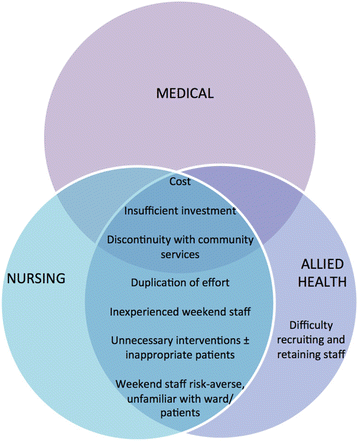What makes weekend allied health services effective and cost-effective (or not) in acute medical and surgical wards? Perceptions of medical, nursing, and allied health workers
- PMID: 28494806
- PMCID: PMC5427575
- DOI: 10.1186/s12913-017-2279-z
What makes weekend allied health services effective and cost-effective (or not) in acute medical and surgical wards? Perceptions of medical, nursing, and allied health workers
Abstract
Background: There is strong public support for acute hospital services to move to genuine 7-day models, including access to multidisciplinary team assessment. This study aimed to identify factors that might enable an effective and cost-effective weekend allied health services on acute hospital wards.
Methods: This qualitative study included 22 focus groups within acute wards with a weekend allied health service and 11 telephone interviews with weekend service providers. Data were collected from 210 hospital team members, including 17 medical, 97 nursing, and 96 allied health professionals from two Australian tertiary public hospitals. All were recorded and imported into nVivo 10 for analysis. Thematic analysis methods were used to develop a coding framework from the data and to identify emerging themes.
Results: Key themes identified were separated into issues perceived as being enablers or barriers to the effective or cost-effective delivery of weekend allied health services. Perceived enablers of effectiveness and cost-effectiveness included prioritizing interventions that prevent decline, the right person delivering the right service, improved access to the patient's family, and ability to impact patient flow. Perceived barriers were employment of inexperienced weekend staff, insufficient investment to see tangible benefit, inefficiencies related to double-handling, unnecessary interventions and/or inappropriate referrals, and difficulty recruiting and retaining skilled staff.
Conclusions: Suggestions for ensuring effective and cost effective weekend allied health care models include minimization of task duplication and targeting interventions so that the right patients receive the right interventions at the right time. Further research into the effectiveness and cost effectiveness of these services should factor in hidden costs, including those associated with managing the service.
Figures
Similar articles
-
Study protocol for two randomized controlled trials examining the effectiveness and safety of current weekend allied health services and a new stakeholder-driven model for acute medical/surgical patients versus no weekend allied health services.Trials. 2015 Apr 2;16:133. doi: 10.1186/s13063-015-0619-z. Trials. 2015. PMID: 25873250 Free PMC article. Clinical Trial.
-
Impact of disinvestment from weekend allied health services across acute medical and surgical wards: 2 stepped-wedge cluster randomised controlled trials.PLoS Med. 2017 Oct 31;14(10):e1002412. doi: 10.1371/journal.pmed.1002412. eCollection 2017 Oct. PLoS Med. 2017. PMID: 29088237 Free PMC article. Clinical Trial.
-
Challenges, uncertainties and perceived benefits of providing weekend allied health services-a managers' perspective.BMC Health Serv Res. 2017 Feb 6;17(1):118. doi: 10.1186/s12913-017-2035-4. BMC Health Serv Res. 2017. PMID: 28166772 Free PMC article.
-
Additional weekend allied health services reduce length of stay in subacute rehabilitation wards but their effectiveness and cost-effectiveness are unclear in acute general medical and surgical hospital wards: a systematic review.J Physiother. 2018 Jul;64(3):142-158. doi: 10.1016/j.jphys.2018.05.004. Epub 2018 Jun 19. J Physiother. 2018. PMID: 29929739
-
Understanding Health Professional Responses to Service Disinvestment: A Qualitative Study.Int J Health Policy Manag. 2019 Jul 1;8(7):403-411. doi: 10.15171/ijhpm.2019.20. Int J Health Policy Manag. 2019. PMID: 31441277 Free PMC article.
Cited by
-
What factors affect early mobilisation following hip fracture surgery: a scoping review.BMJ Open Qual. 2024 Jan 21;12(Suppl 2):e002281. doi: 10.1136/bmjoq-2023-002281. BMJ Open Qual. 2024. PMID: 38253357 Free PMC article.
-
Translating evidence into practice: a longitudinal qualitative exploration of allied health decision-making.Health Res Policy Syst. 2021 Mar 18;19(1):38. doi: 10.1186/s12961-020-00662-1. Health Res Policy Syst. 2021. PMID: 33736670 Free PMC article. Clinical Trial.
-
Building consensus on prescribing self-directed occupational therapy activities: A Delphi study.Aust Occup Ther J. 2025 Jun;72(3):e70029. doi: 10.1111/1440-1630.70029. Aust Occup Ther J. 2025. PMID: 40484700 Free PMC article.
-
Patients' and professionals' perspectives on the consideration of patients' convenient therapy periods as part of personalised rehabilitation: a focus group study with patients and therapists from inpatient neurological rehabilitation.BMC Health Serv Res. 2022 Mar 21;22(1):372. doi: 10.1186/s12913-022-07755-3. BMC Health Serv Res. 2022. PMID: 35313879 Free PMC article.
-
Self-managed occupational therapy and physiotherapy for adults receiving inpatient rehabilitation ('My Therapy'): protocol for a stepped-wedge cluster randomised trial.BMC Health Serv Res. 2021 Aug 13;21(1):811. doi: 10.1186/s12913-021-06462-9. BMC Health Serv Res. 2021. PMID: 34384427 Free PMC article.
References
-
- Lilford RJ, Chen Y-F. The ubiquitous weekend effect: moving past proving it exists to clarifying what causes it. BMJ Quality & Safety. 2015;bmjqs-2015-004360. - PubMed
MeSH terms
LinkOut - more resources
Full Text Sources
Other Literature Sources



